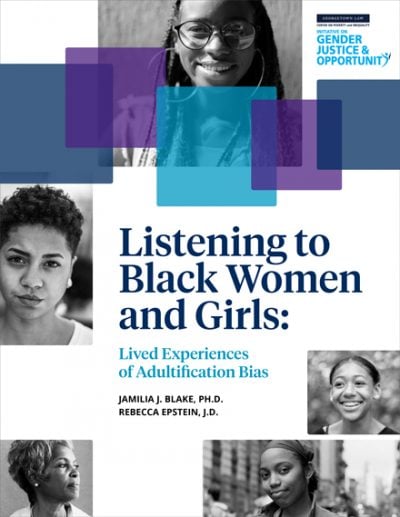Early Bias
The perceived divide between black and white girls appears as early as age 5 — with adults viewing young black girls as “less innocent” than their white peers.

This report by the Georgetown Law Center on Poverty and Inequality shares insights and recommendations garnered from focus groups with black girls and women. The topic? Adultification bias.
What is adultification bias? It is the perception that black girls are less innocent and more adult-like than their white peers of the same age. This publication follows a 2017 report by the same researchers, called Girlhood Interrupted, that examined the quantitative ramifications of adultification bias.
The study asked adults fundamental questions about their views of either black girls or white girls across four age categories: 0–4, 5–9, 10–14 and 15–19-years old. The questions were intended to measure perceptions of innocence and included questions such as: “Do black girls [or white girls] need comforting?” and “Do black girls [or white girls] need to be protected?”
The results of the study were shocking: They revealed that adults perceive black girls as less innocent than white girls as young as 5–9-years-old. The most significant differences in participants’ perceptions of black girls’ innocence appeared in the 10–14 year age group, with significant differences also apparent in age groups 5–9 and 15–19.
The goal was to measure participants’ responses to our adultification findings by asking them about their real-world observations and seeking their insights about solutions to overcome this bias, as well as directions for future research. To that end, participants were asked whether the results of the original study align with their lived experiences and whether they believe the findings presented in the Girlhood Interrupted report would contribute to meaningful change. Researchers also examined what new research questions they should ask to deepen their understanding of the adultification bias faced by black girls, and what is most needed to address that bias.
In response, participants supported the finding that black girls experience adultification bias. Further, they suggested several related factors that contribute to that bias, including the role played by negative stereotypes of Black women, as well as racism, sexism, and poverty. This report highlights the key findings.
The women and girls who shared their experiences have lent a rich sense of urgency to the work of overcoming stereotypes and adultification bias. They’ve reminded us that we must create and provide systems of support that give black girls the freedom to make mistakes — and grow — in an understanding and nurturing environment.
We hope you'll find value in this report. We’d love to get a little information from you, which we'll use to notify you about relevant new resources.